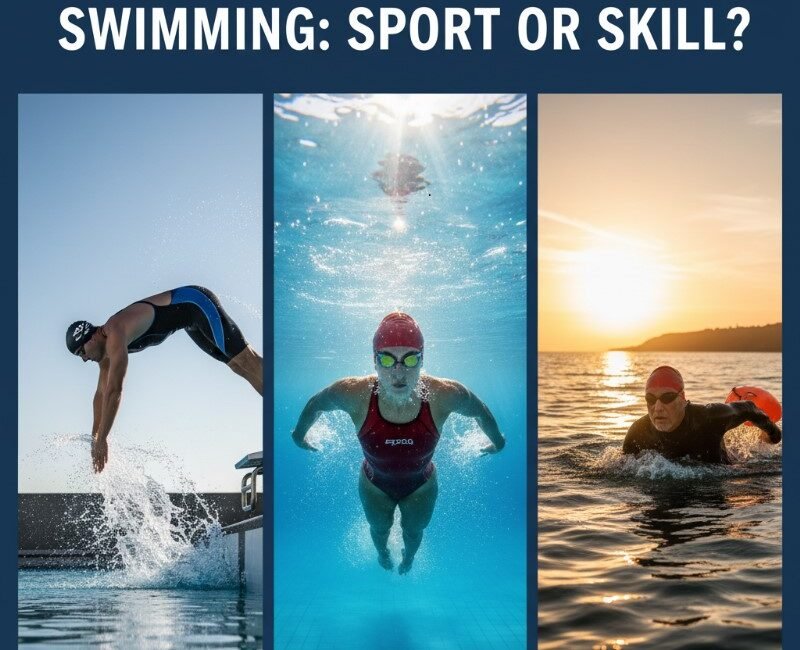
Ask ten people whether swimming is a sport, and you’ll likely get mixed answers. Some say it’s a relaxing pastime; others see it as one of the hardest physical activities out there.
At LegendarySwimmers.com, we dive deep into the water to answer this age-old question — and prove that swimming isn’t just exercise; it’s a true, full-fledged sport that challenges body and mind alike.
What Defines a Sport?
A sport typically involves physical exertion, skill, and structured competition.
By that definition alone, swimming easily qualifies.
Physical Exertion: Every stroke demands energy, endurance, and precise breathing control.
Skill: Swimmers spend years mastering technique — from turns to pacing and starts.
Competition: Regulated by World Aquatics (formerly FINA), swimming has set rules, records, and international championships.
From backyard pools to the Olympic stage, swimming fulfills every requirement of athletic competition.
The Power and Precision Behind Every Stroke
Swimming is one of the few sports that works nearly every muscle in the body. The resistance of water builds strength while improving flexibility and endurance.
What makes swimming physically elite:
Engages all major muscle groups
Strengthens the heart and lungs
Improves balance and coordination
Enhances flexibility and range of motion
In short, swimmers are among the most complete athletes in the world — agile, powerful, and mentally tough.
The Mental Game: Focus, Rhythm, and Determination
What most people overlook is the mental discipline that swimming demands. Swimmers train for hours each day, often alone, counting strokes and maintaining focus through repetition.
That solitude builds grit and resilience — traits shared by world-class athletes across every sport. As Olympian Michael Phelps once said, “You can’t put a limit on anything. The more you dream, the farther you get.”
Swimming pushes the mind just as hard as it pushes the body.
Swimming on the Global Stage
Since entering the Olympic Games in 1896, swimming has become one of the most popular and respected sports worldwide.
Legends like Mark Spitz, Katie Ledecky, and Caeleb Dressel have inspired millions with performances that blend artistry and athleticism.
At LegendarySwimmers.com, we celebrate those champions — and every swimmer chasing their personal best.
Beyond Competition: Why Swimming Is a Lifelong Sport
Even if you’re not aiming for Olympic gold, swimming offers lifelong physical and mental benefits. It’s ideal for all ages because it’s:
Low-impact, making it easy on joints and muscles
Therapeutic, helping reduce stress and anxiety
Inclusive, accessible to everyone regardless of age or fitness level
From a health and wellness perspective, swimming is more than a sport — it’s a lifestyle.
The Verdict: Swimming Is 100% a Sport
When you combine endurance, power, focus, and competition, swimming doesn’t just fit the definition of a sport — it sets the standard.
It challenges every aspect of human performance while promoting mental strength and physical balance. Whether you’re racing laps or training for health, swimming is pure sport at its finest.
So next time someone calls swimming “just exercise,” smile and say — it’s not just a sport. It’s one of the greatest sports ever created.
FAQs
1. Is swimming officially recognized as a sport?
Yes. It’s governed by World Aquatics and featured prominently in the Olympics.
2. Why do some people think swimming isn’t a sport?
Because they view it as leisure instead of recognizing the competition, technique, and training involved.
3. What makes swimming different from land-based sports?
Water adds resistance, making every movement a full-body challenge while reducing impact on joints.
4. Can swimming replace gym workouts?
Absolutely. It builds muscle, endurance, and flexibility while burning calories efficiently.
5. Is swimming suitable for beginners?
Yes — it’s one of the safest and most effective sports for all ages and skill levels.

